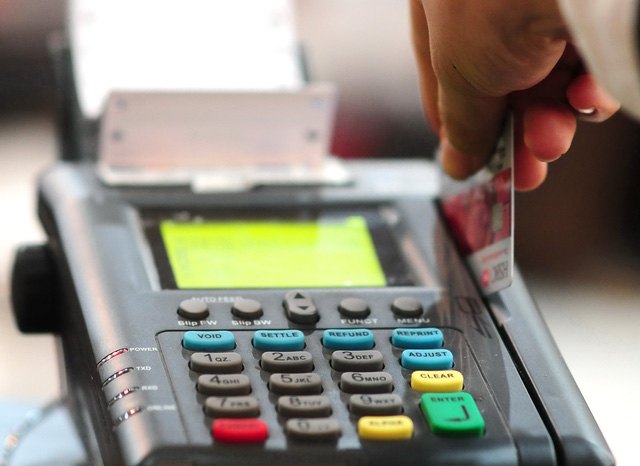Seventy million of the country’s 77 million bank cards use magnetic stripe technology to store personal bank information
Vietnam is fast becoming a hot spot for credit card fraud as magnetic stripe cards remain the predominant form of bank card in the country, as opposed to the smart card technology now employed by financial institutions in most developed countries, the National Payment Corporation of Vietnam (NAPAS) warned on Wednesday.
Magnetic stripe cards, or swipe cards, store information on a black magnetic stripe on their back.
Bank and payment machines decode the stripe when it passes through a special reader.
Chip cards, on the other hand, store data on integrated circuits protected by complex cryptographic algorithms, providing heightened security against fraud compared to the much simpler encryption method used with magnetic stripe cards.
The Asia-Pacific area has the lowest transition rate in the world, just 45 percent, for making the switch from swipe cards to smart cards, according a figure shared by NAPAS from EMV Co., a company which provides payment solutions for smart payment cards
In Vietnam, 70 million of the country’s 77 million bank cards use magnetic stripe technology to store personal bank information.
NAPAS has so far issued an official standard for chip technology – including contact, contactless, and dual-interface chip cards – along with a roadmap to transition the country’s consumers to smart card technology, but the process has been slow as yet.
Contact smart cards require users to insert the card into a machine to be read, while contactless smart cards only need to be near a scanner.
Dual interface chip cards can be processed with both contact and contactless card readers.
Despite the advantages of chip cards, commercial banks in Vietnam have been hesitant to move forward with a State Bank of Vietnam request for a full transition due to concerns over high costs.
Local lenders say issuing chip cards would cost banks a minimum of US$1 per card, equating to a combined bill of nearly VND1,100 billion ($48.23 million) for the country’s four major banks to complete the transition.
According to data published by EMV, China, with its population of 1.2 billion, has already nearly finished making the switch from magnetic stripe cards to chip cards.
Malaysia, once considered the “capital of card fraud,” successfully introduced chip cards to the entire market in early 2018.
Thailand, which commenced an action plan for bank card transitions in 2016, is expected to completely transition the country to chip cards by January 2019.
Ten percent of the Indonesian market currently uses chip cards and the country is expected to accelerate the transition to the full market by 2020, one year ahead of schedule.






















































